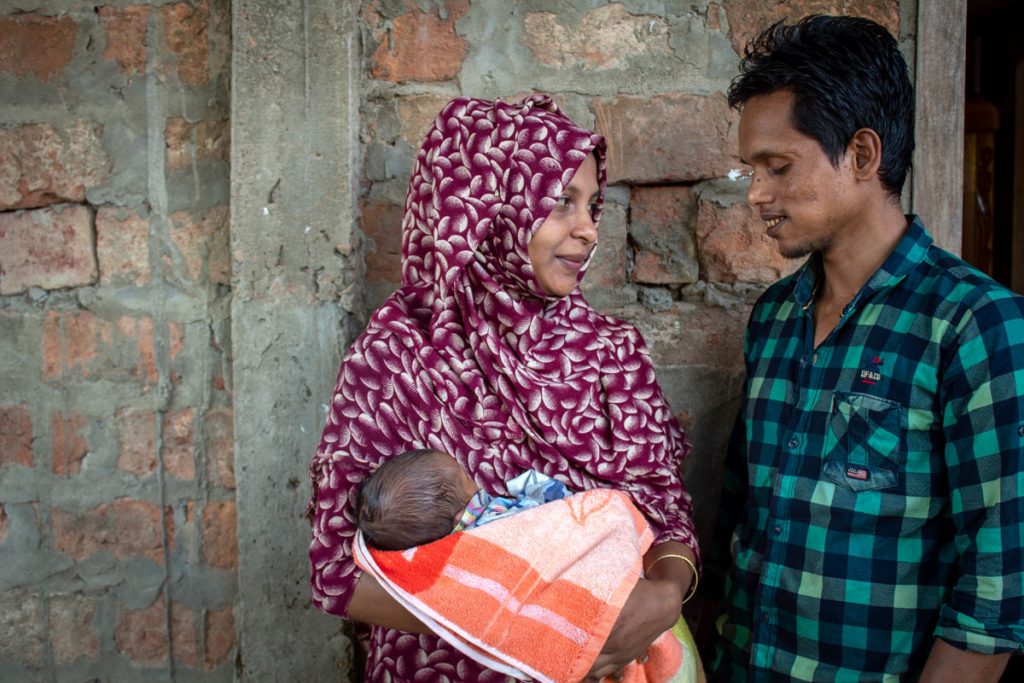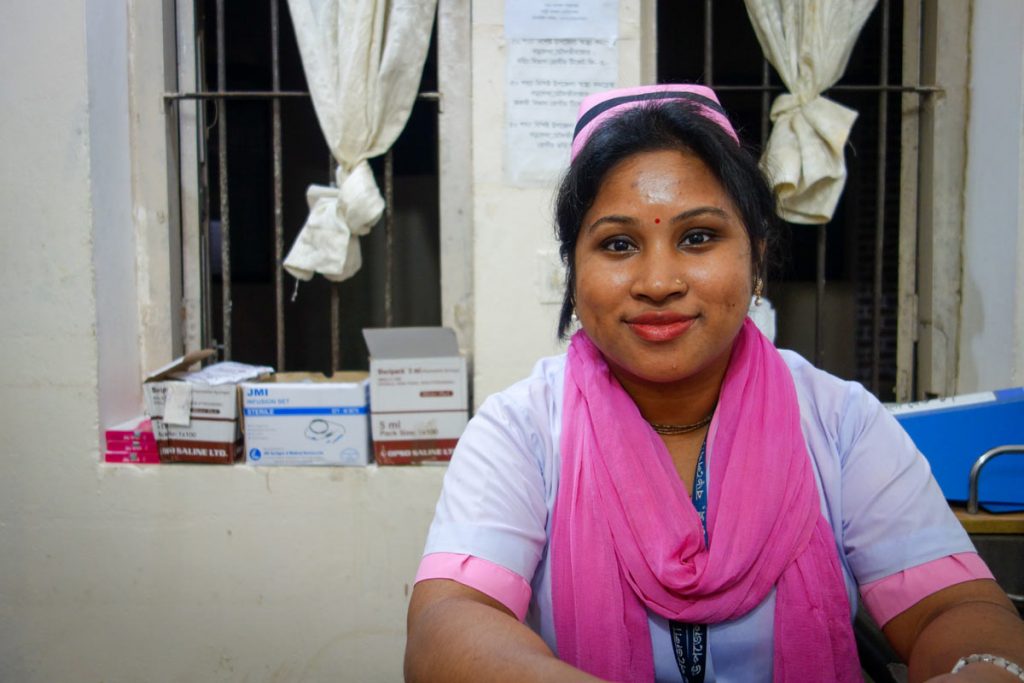Barlekha Upazila, Bangladesh—Not yet out of her teens, Runa Akhtar became a first-time mother, giving birth to a healthy baby girl at Barlekha Upazila Health Complex in November 2019. After conducting the delivery safely, midwife Monita Singha asked Runa whether she wanted to accept a family planning (FP) method right away. Having graduated from school, Runa had read about FP, and as midwife Monita spoke, that material from her time in secondary school came back to her. She was sure she did not want another baby too soon.

Midwife Monita counseled Runa on the merits of FP and told her about the options provided free of cost by the government, including a newly offered long-acting, reversible method.
In the past year, a landmark government policy has given Bangladesh midwives the authority to provide women with postpartum FP (PPFP) and, specifically, the postpartum intrauterine device (PPIUD). The decision in December 2018, advocated for and supported by Jhpiego, expands access to FP options for Bangladeshis. A PPIUD affords families a safe, reversible method that prevents pregnancy for up to 10 years.
With the support of her husband and sister-in-law, Runa chose the PPIUD.
Midwife Monita assured Runa that she could return to consult her anytime if she had any concern and could have the device removed whenever she wanted to get pregnant again. She asked her to come back after 6 weeks for a follow-up visit.
PPFP is one of the most effective ways to address the high unmet need that exists in Bangladesh during the postpartum period while also preventing needless maternal, infant and child deaths. According to the 2014 Bangladesh Demographic and Health Survey, 48% of newly postpartum women (< 12 months) do not want any more children, and 92% want to wait at least 2 years before having another child. However, according to 2017 data, modern PPFP uptake at 6 months postpartum is only at 46%. Midwives and nurse-midwives represent a major, untapped opportunity to satisfy the demand for FP services in the immediate postpartum period for women in Bangladesh.
Through a comprehensive advocacy effort, Jhpiego has been working with the Government of Bangladesh to ensure that midwives and nurse-midwives have the training, policy mandate and access to commodities that they need to offer high-quality PPFP counseling and services to women in the immediate postpartum period.
Efforts have resulted in bringing together key decision-makers from three critical directorate generals—FP, Health Services, and Nursing and Midwifery—to align policy priorities, strategies and planning for PPFP.
Streamlining data to ensure that progress and performance on the provision of PPFP services can be effectively tracked across departments, Jhpiego has also continued to train and provide technical assistance for district-level quality improvement team members, who will be routinely monitoring and supervising midwives on quality improvement of PPFP services.
Midwife Monita, who provided the PPIUD to Runa, attended a 12-day comprehensive training on PPFP by Jhpiego earlier in 2019. It has brought about a newfound understanding and appreciation for FP in her midwifery colleagues. Says midwife Sharmin Akhtar, who is also the labor room in-charge: “To be honest, we did not give much importance to FP before this training. But now, our awareness and knowledge about FP has increased tremendously.”

Equipped with new knowledge and skills, these women ensure that they counsel women and families, explain the merits and side effects of all FP methods, and provide the method the woman chooses. Additionally, a supportive environment, along with a steady supply of commodities, allows them to do their job well.
“This is a tremendous change for our national FP program. It has great impact on overall FP services,” says Dr. Mohammad Moinuddin Ahmed, line director for the clinical contraceptive service delivery program in the Directorate General of FP.
This project is made possible through support from Margaret A. Cargill Philanthropies.
Returning to Barlekha Upazila Health Complex for a follow-up visit, Runa met with midwife Monita, who examined her and her daughter, Taiba. Enjoying new motherhood, Runa says: “I’m not facing any trouble after taking this method. I’m also being able to care for my child well. I do all my chores and am breastfeeding my baby easily.”
She speaks eloquently about her decision and its reasons: “My mother had seven sisters and one brother. She herself had four children. That is a lot. In today’s world, what is the point of having so many children if you can’t raise them well! Two children are enough, I think. That is why I took this decision.”
With her husband by her side, and the safety net of FP, she left the health facility dreaming of a bright future for her baby girl. “For my daughter, I want her to be more educated than me. If it is in her destiny and in ours, if Allah wishes, then she could become something important in her life, but my biggest desire is for her to be very well educated,” she says.
…we have taken this policy with the advocacy and technical support of Jhpiego.
Jhpiego is playing an important role in establishing postpartum family planning services in our country. They are engaged in policy advocacy related to maternal and family planning issues. They are providing technical support in conducting training on postpartum family planning for service providers, such as nurses, midwives and doctors working at government health facilities. They also provide support in conducting advocacy at national and district levels, conducting different orientation workshops on postpartum family planning. Besides, they are providing technical support in developing tools and checklists for quality improvement, providing support in developing various types of training manuals and guidelines. And Jhpiego has played an important role in policymaking level. During our decision of task sharing for postpartum family planning service provision, which can be provided by nurses and midwives at delivery points under the Directorate General for Health Services, enhancing postpartum family planning coverage and quality, we have taken this policy with the advocacy and technical support of Jhpiego. We hope that Jhpiego will continue to support our journey in clinical contraception in postpartum family planning services.
– Dr. Moinuddin Ahmed,
Line Director for the Clinical Contraceptive Service Delivery Program (Policymaker), Directorate General of FP,
Ministry of Health and Family Welfare
Indrani Kashyap is the Asia Regional Communications Specialist for Jhpiego.



